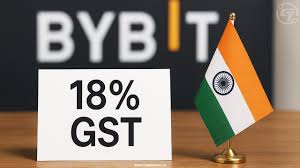Indian Crypto Traders Hit with New 18% GST on Bybit: What It Means for You. By ChainFabricNews
 |
| Image source: The Crypto Times |
Indian crypto users woke up to a significant change this July—Bybit, a major global crypto exchange, has started charging an 18% Goods and Services Tax (GST) on a wide range of services. This new tax, introduced on July 7, 2025, applies to trading fees, staking, margin trading, and even simple deposits and withdrawals.
For many Indian traders, this is yet another financial pinch on top of the 30% income tax on crypto profits and 1% TDS (Tax Deducted at Source) already in place. Now, every time a user pays a fee on Bybit, they’ll also have to pay 18% GST on top of it.
What Services Are Affected?
Bybit has clarified that the GST will apply to a variety of its offerings, including:
-
Spot and margin trading
-
Staking rewards and earnings
-
Fiat deposits and withdrawals (via bank or card)
-
Liquidation fees, auto-conversions, and more
Even services like Bybit Pay and crypto copy trading are now taxable. In short, nearly every action that incurs a platform fee will now be more expensive for Indian users.
Why This Matters
This move is part of a broader trend where Indian authorities are tightening regulations around cryptocurrencies. While the government has not outright banned crypto, it has made trading more expensive and complex through various tax measures.
For traders, this means that profit margins will shrink. Imagine this: if you pay ₹1,000 in trading fees, you now have to add ₹180 just for GST. That’s on top of TDS and capital gains tax, meaning the same transaction could be taxed three times in different ways.
How Are Traders Reacting?
Unsurprisingly, many users are frustrated. Some are exploring Decentralized Finance (DeFi) platforms that don’t charge traditional platform fees or report to Indian tax authorities. Others are simply reducing their trading activity or looking for more tax-friendly jurisdictions.
A growing number of traders also hope that the government will reconsider the current tax structure. Leading Indian exchanges like CoinSwitch and CoinDCX have called for a lower transaction fee—perhaps 0.1%—which would encourage trading activity while still keeping it regulated and traceable.
Looking Ahead: Hope for Balance
The timing of this GST move is especially important because the Indian government is expected to release a new crypto policy draft later in July. This upcoming paper may include updated regulations around stablecoins, investor protection, and potentially a more balanced tax structure.
It’s clear that India is not trying to ban crypto. Instead, the government is attempting to regulate it in a way that’s consistent with traditional finance. However, the current triple-tax setup could push everyday users away from legitimate platforms.
Final Thoughts
India’s crypto landscape is evolving quickly. With more regulations, users must stay informed and plan their trades wisely. While the new 18% GST from Bybit is a tough pill to swallow, it could also lead to important conversations around tax reform and better clarity in the months to come.
For now, traders should keep records of all transactions, consult with tax experts, and monitor updates closely. The crypto journey in India is far from over—it’s just entering a new chapter.



Comments
Post a Comment